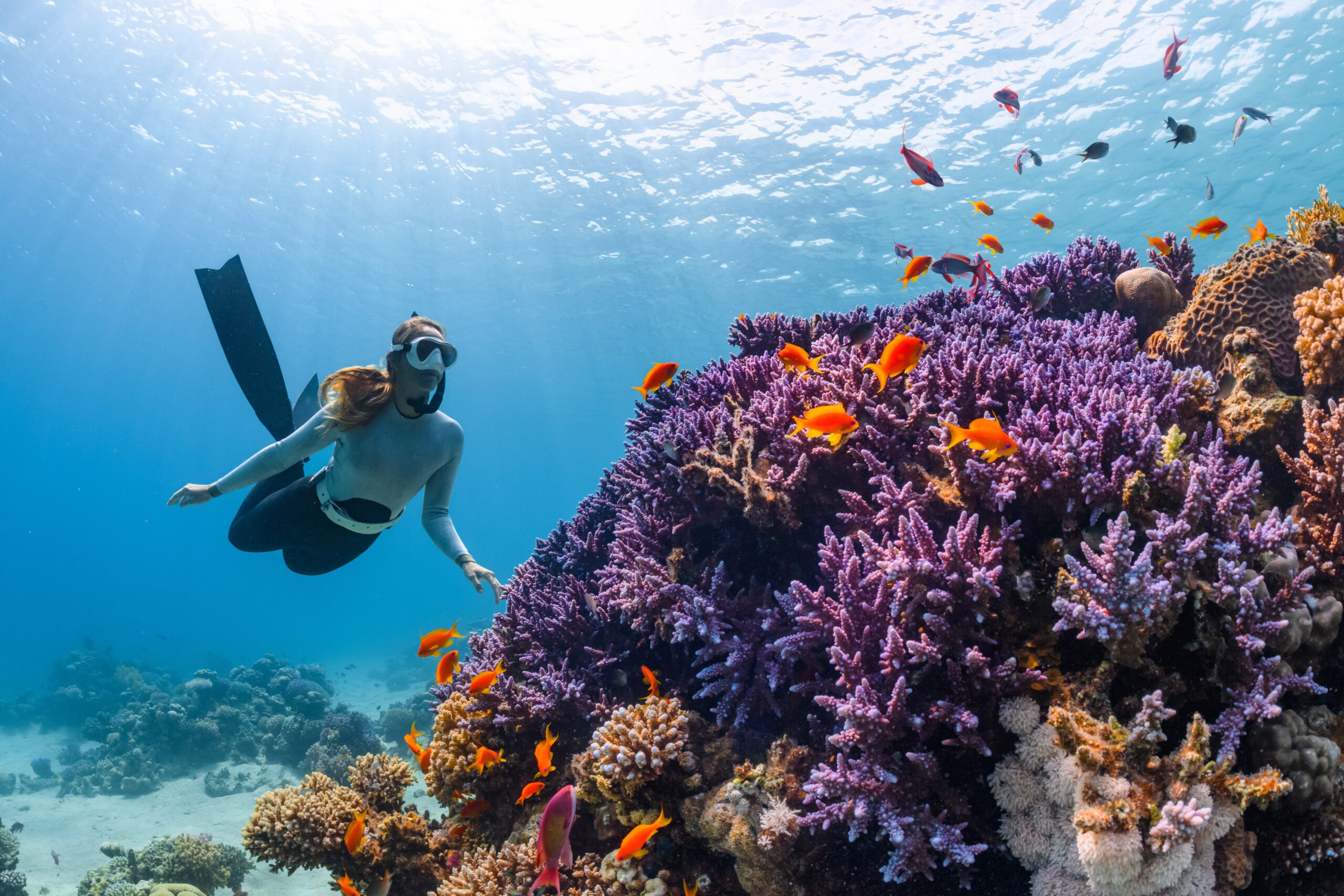When planning a vacation, one of the things that pet owners have to consider is how to take care of their pets while they’re away. For fish owners, one of the main concerns is how to feed their fish while they’re on vacation. Fortunately, there are several ways to ensure that your fish are well-fed and healthy even when you’re not around.
One option is to ask a friend or neighbor to feed your fish while you’re away. However, this may not always be possible or reliable. Another option is to use a vacation fish feeder, which is a device that releases fish food at predetermined intervals. These feeders come in different types, including battery-operated and air-powered, and can be purchased at pet stores or online. Automatic fish feeders are also an option, which can be used on a daily basis anyway. Additionally, there are slow-release fish food options that can last for weeks, which can be a good option if you’re going away for an extended period.
It’s important to keep in mind that fish can survive for weeks without food, so it’s not necessary to overfeed them before leaving. Overfeeding can actually harm the fish and cause water quality issues. When using a vacation fish feeder or automatic fish feeder, it’s crucial to test it out before leaving to make sure it’s working properly. It’s also a good idea to have a backup plan in case the feeder fails or if there’s a power outage.
Understanding Fish Nutrition
Proper nutrition is essential for the health and well-being of your fish. Understanding the nutritional requirements of your fish is the first step to choosing the right food for them.
Different fish species have different nutritional needs. Some fish are herbivores, while others are carnivores or omnivores. It is important to research the specific nutritional requirements of your fish species to provide them with a balanced diet.
Fish food is available in various forms, including flakes, pellets, freeze-dried, and frozen. Live food, such as brine shrimp, can also be fed to fish. Live food is an excellent source of nutrition and can help to stimulate the natural feeding behavior of fish.
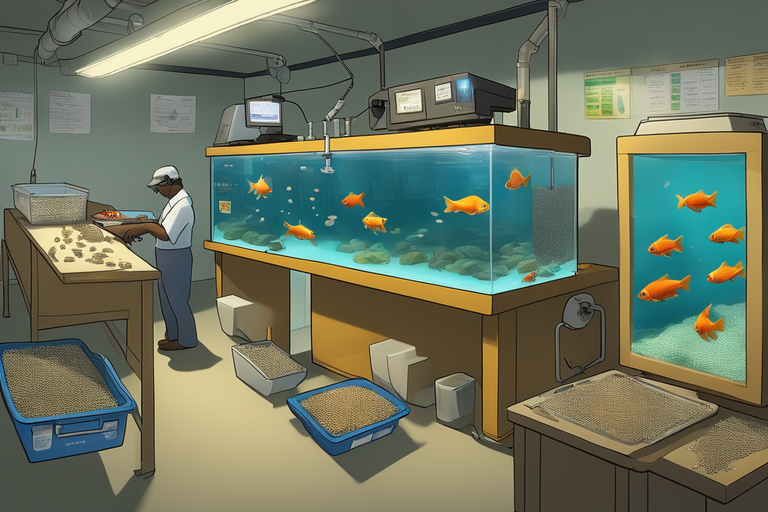
When choosing the right food for your fish, it is important to consider the nutritional content of the food. Fish require a balanced diet that includes proteins, fats, carbohydrates, vitamins, and minerals. Some fish food products are specifically formulated for certain fish species or stages of development.
It is also important to consider the feeding habits of your fish. Some fish are surface feeders, while others feed on the bottom of the tank. Choosing the right type of food and feeding method can help to ensure that all of your fish receive the nutrition they need.
In summary, understanding the nutritional requirements of your fish is essential for providing them with a balanced diet. Choosing the right food and feeding method can help to ensure that your fish remain healthy and happy while you are away on vacation.
Pre-Vacation Preparation
Before going on vacation, it is important to ensure that your fish will be well taken care of in your absence. Proper preparation can ensure that your fish remain healthy and happy, even when you are not there to tend to them. Here are some tips for pre-vacation preparation:
Instructions for the Caretaker
If you have someone who will be taking care of your fish while you are away, it is important to provide clear and concise instructions on how to feed them and how often. This will ensure that your fish receive the appropriate amount of food and remain healthy. Be sure to also provide contact information in case of an emergency.
Water Change and Tank Maintenance
Performing a water change and tank maintenance before leaving for vacation is a good idea. This will help to ensure that the water quality is good and that the tank is in good condition before leaving. It is recommended to perform a 25% water change before leaving on vacation.
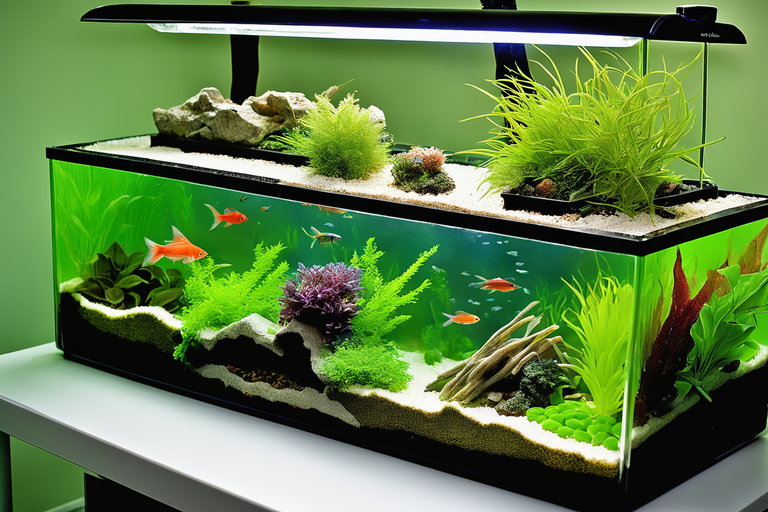
Top off the Aquarium
It is important to top off the aquarium before leaving on vacation. This will help to ensure that the water level remains consistent and that the fish have enough water to swim in. Be sure to use dechlorinated water when topping off the aquarium.
Monitor Water Quality
Monitoring the water quality of the aquarium before leaving on vacation is important. This includes checking the pH level and ammonia levels. If the levels are not within the appropriate range, take action to correct them before leaving.
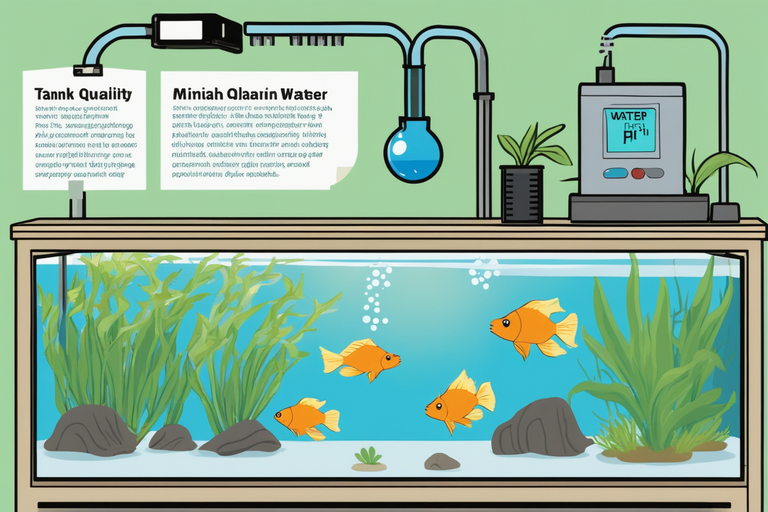
In summary, pre-vacation preparation is crucial to ensure that your fish remain healthy and happy while you are away. Providing clear instructions for the caretaker, performing a water change and tank maintenance, topping off the aquarium, and monitoring water quality are all important steps to take before leaving on vacation.
Automatic Fish Feeders
One of the most reliable ways to ensure that your fish are fed while you’re away on vacation is to use an automatic fish feeder. These devices can be programmed to dispense food at set intervals, ensuring that your fish receive the appropriate amount of food each day.
Automatic fish feeders come in a variety of styles and sizes, so it’s important to choose one that’s appropriate for your aquarium. Some models are designed to be mounted on the side of the tank, while others are designed to sit on top of the tank. Most automatic feeders come with a dispenser that can hold several days’ worth of food, so you don’t have to worry about refilling the feeder every day.
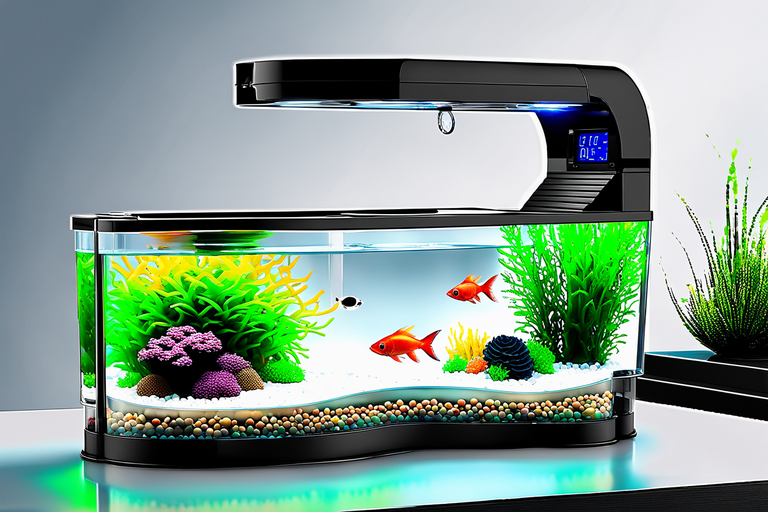
One of the key features of automatic fish feeders is the timer. The timer allows you to set the feeding schedule for your fish, so you can ensure that they receive the appropriate amount of food at the appropriate times. Some automatic feeders allow you to set multiple feeding times throughout the day, while others only allow for one feeding per day.
It’s important to note that automatic feeders can malfunction, so it’s always a good idea to have a backup plan in case the feeder fails. This could mean having a friend or neighbor stop by to check on your fish and feed them manually if necessary.
Overall, automatic fish feeders are a great option for anyone who wants to ensure that their fish are fed while they’re away on vacation. Just be sure to choose a high-quality feeder and have a backup plan in case of any malfunctions.
Feeder Blocks and Slow-Release Feed
One option for feeding fish while on vacation is to use feeder blocks or slow-release feed. These products are designed to dissolve slowly and release food periodically as the block gradually dissolves. Some feeder blocks are made of gel while others are made of a calcium block.
While these products can be convenient, it is important to note that they may not be the best option for all fish. Some fish may not eat the feeder block or may not be able to digest it properly. Additionally, the block may mess with the water quality of the tank, which can be harmful to the fish.
If using a feeder block or slow-release feed, it is important to choose a product that is designed for the specific type of fish in the tank. It is also important to follow the instructions carefully and monitor the fish closely to ensure that they are eating the food and that the water quality remains stable.
Overall, feeder blocks and slow-release feed can be a convenient option for feeding fish while on vacation, but it is important to choose the right product and use it properly to ensure the health and safety of the fish.
Hiring a Fish or Pet Sitter
One of the best ways to ensure that your fish are well-fed and taken care of while you’re on vacation is to hire a fish or pet sitter. A fish sitter is someone who will come to your home and feed your fish, as well as check on the overall health of your aquarium. A pet sitter, on the other hand, can take care of all your pets, including your fish.
When hiring a fish or pet sitter, it’s important to find someone you trust. You’ll be giving them access to your home and entrusting them with the care of your pets, so it’s essential to choose someone who is reliable and responsible. You can ask for recommendations from friends and family, or search for a reputable pet sitting service in your area.
Before hiring a sitter, it’s important to provide them with clear instructions on how to care for your fish. This includes information on the type of fish you have, how much and how often to feed them, and any special requirements they may have. You can also leave a written guide or set up a video call to go over the instructions in detail.
It’s also a good idea to give your sitter a test run before you leave for vacation. This will give you the opportunity to see how they interact with your fish and ensure that they understand your instructions. You can also set up a schedule for them to check in with you while you’re away, so you can stay updated on your fish’s well-being.
Overall, hiring a fish or pet sitter can give you peace of mind while you’re away on vacation. With clear instructions and a trustworthy sitter, you can ensure that your fish are well-fed and taken care of until you return home.
Special Care for Different Fish Types
Different types of fish have different dietary needs, and it’s important to take that into consideration when planning for their care while you’re away on vacation. Here are some special care tips for different fish types:
Tropical Fish
Tropical fish are a popular choice for aquariums, but they can be picky eaters. It’s important to provide them with a varied diet that includes both flakes and frozen foods. Some tropical fish also require live food, such as brine shrimp or bloodworms. If you’re going to be away for an extended period of time, it’s a good idea to ask a trusted friend or family member to feed your fish while you’re gone.
Freshwater Fish
Freshwater fish are generally easier to care for than saltwater fish, but they still require a balanced diet. Most freshwater fish will do well on a diet of flakes or pellets, but some may require live or frozen foods. It’s important to monitor your fish for signs of illness, such as loss of appetite or lethargy, and adjust their diet accordingly.
Adult Fish
Adult fish have different dietary needs than juvenile fish. As fish mature, their dietary requirements change, and they may require more protein or fiber. It’s important to research the specific dietary needs of your fish and adjust their diet accordingly.
Reef Tank Fish
Reef tank fish require a specialized diet that includes both plant-based and meat-based foods. It’s important to provide them with a variety of foods, including algae, plankton, and small crustaceans. If you’re going to be away for an extended period of time, consider using an automatic feeder that can dispense a variety of foods.
Picky Eaters
Some fish are picky eaters and may refuse to eat certain types of food. It’s important to provide them with a variety of foods and monitor their appetite closely. If your fish are particularly picky, you may need to experiment with different types of food until you find one that they like.
Signs of Illness
It’s important to monitor your fish for signs of illness, such as loss of appetite, lethargy, or unusual behavior. If you notice any of these signs, it’s important to adjust their diet or seek veterinary care if necessary.
Maintaining Proper Aquarium Conditions
When leaving for vacation, it is important to ensure that the aquarium conditions are maintained properly. Here are some tips to keep the aquarium healthy while you are away:
Water Temperature
The water temperature should be maintained at the appropriate level for the fish species in the aquarium. If the temperature is too high or too low, it can cause stress to the fish and lead to health problems. It is recommended to keep the temperature stable by using a reliable heater with a thermostat.
Aquarium Lights
It is important to turn off the aquarium lights when leaving for vacation. Leaving the lights on can cause excessive algae growth, which can lead to poor water quality. Additionally, fish need a period of darkness to rest and regulate their biological functions.
Filtration
The filtration system should be in good working condition before leaving for vacation. The filter should be cleaned and the media should be replaced if necessary. A clean filter will ensure that the water quality remains high and the fish remain healthy.
Uneaten Food
Uneaten food can cause water quality issues and lead to health problems for the fish. It is important to remove any uneaten food before leaving for vacation. One way to prevent overfeeding is to use an automatic fish feeder.
By following these tips, the aquarium conditions can be maintained properly while on vacation.
Managing Fish Feeding and Health
Feeding fish while on vacation can be a tricky task. Overfeeding can lead to water quality issues and health problems, while underfeeding can lead to starvation and stress. Therefore, it is important to manage fish feeding and health properly to ensure their well-being during your absence.
One way to manage fish feeding is to use an automatic fish feeder. These devices can dispense food at regular intervals, ensuring that your fish receive the right amount of food. However, it is important to test the device before leaving to ensure that it is working correctly. It is also recommended to set the device to dispense multiple small meals throughout the day rather than one large meal to prevent overeating.
Another way to manage fish feeding is to find a fish sitter. This can be a friend or family member who can come to your home and feed your fish daily. It is important to provide clear instructions on how much to feed and how often. It is also recommended to show the sitter how to check the fish’s physical condition and behavior to ensure their health.
If finding a sitter is not an option, commercial vacation feeders are available at most fish stores. These feeders are designed to slowly dissolve and release food into the water over several days. However, it is important to note that these feeders can lead to overfeeding and water quality issues if not used correctly.
Regardless of the feeding method chosen, it is important to monitor the fish’s physical condition and behavior upon returning from vacation. Signs of overeating include bloating and lethargy, while signs of underfeeding include weight loss and hiding. If any of these signs are present, it is important to adjust the feeding schedule accordingly.
In summary, managing fish feeding and health while on vacation requires careful planning and consideration. Whether using an automatic feeder, a fish sitter, or a commercial feeder, it is important to ensure that the fish receive the right amount of food and are in good physical condition. By following these tips, fish owners can enjoy their vacation without worrying about their beloved pets.
Frequently Asked Questions
How long can fish survive without food while on vacation?
Believe it or not, many fish can survive for weeks on end without food. However, it is not recommended to leave your fish without food for more than two weeks. It’s important to note that the length of time a fish can survive without food depends on several factors, such as the species of fish, its age, and overall health.
Do vacation feeders work for fish?
Yes, vacation feeders can be a great solution for feeding your fish while you’re away. They are designed to slowly release food into the aquarium over a period of time, ensuring that your fish are fed regularly. However, it’s important to note that not all vacation feeders are created equal. Some may not work as well as others, so it’s important to do your research and choose a high-quality feeder.
What fish food can last for 2 weeks?
If you’re going to be away for two weeks or less, you can use slow-release fish food. This type of food is designed to dissolve slowly over time, providing your fish with a steady supply of nutrition. Another option is freeze-dried or dehydrated fish food, which can last for up to two weeks. It’s important to choose a high-quality fish food that is appropriate for the species of fish you have in your aquarium.

